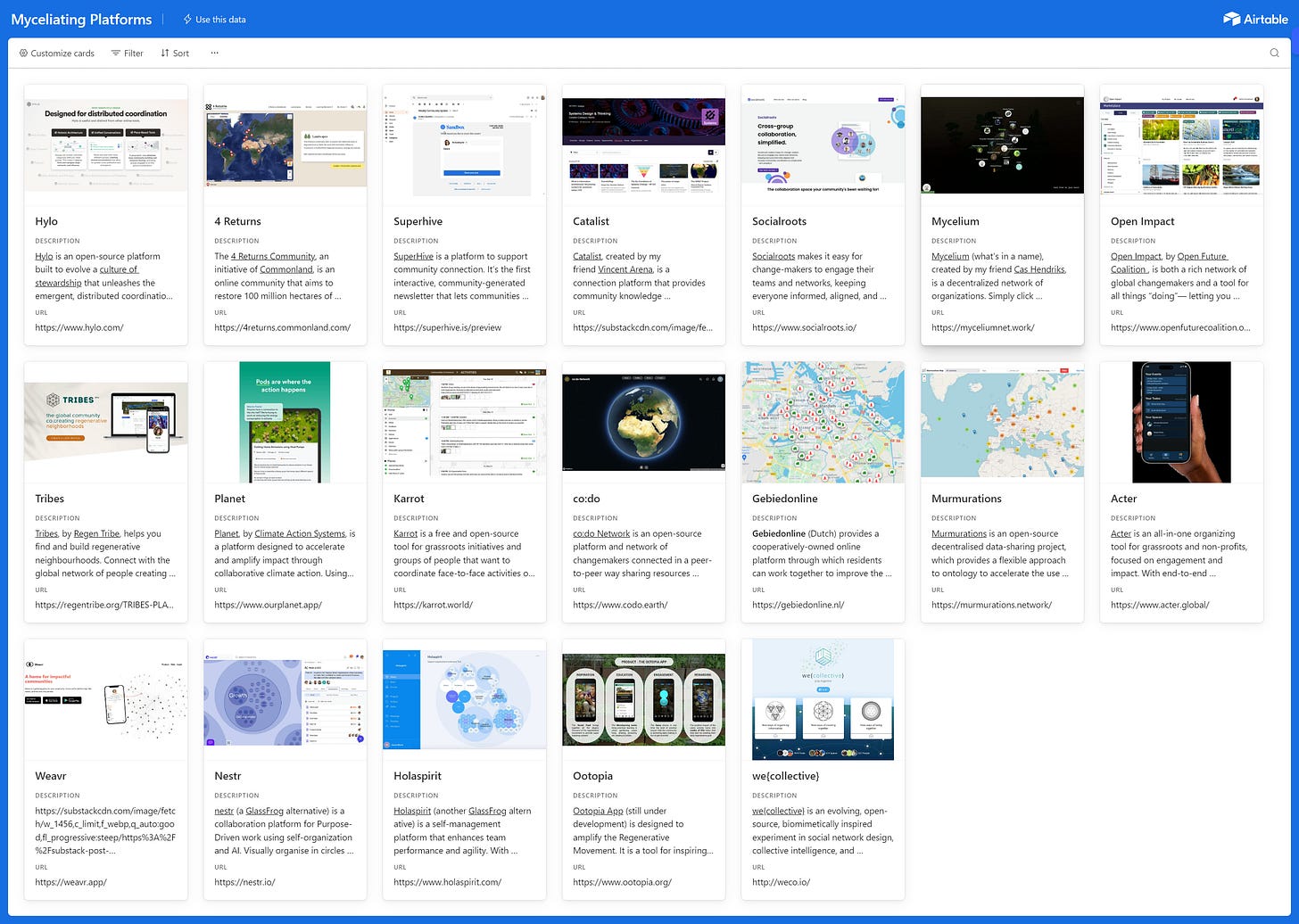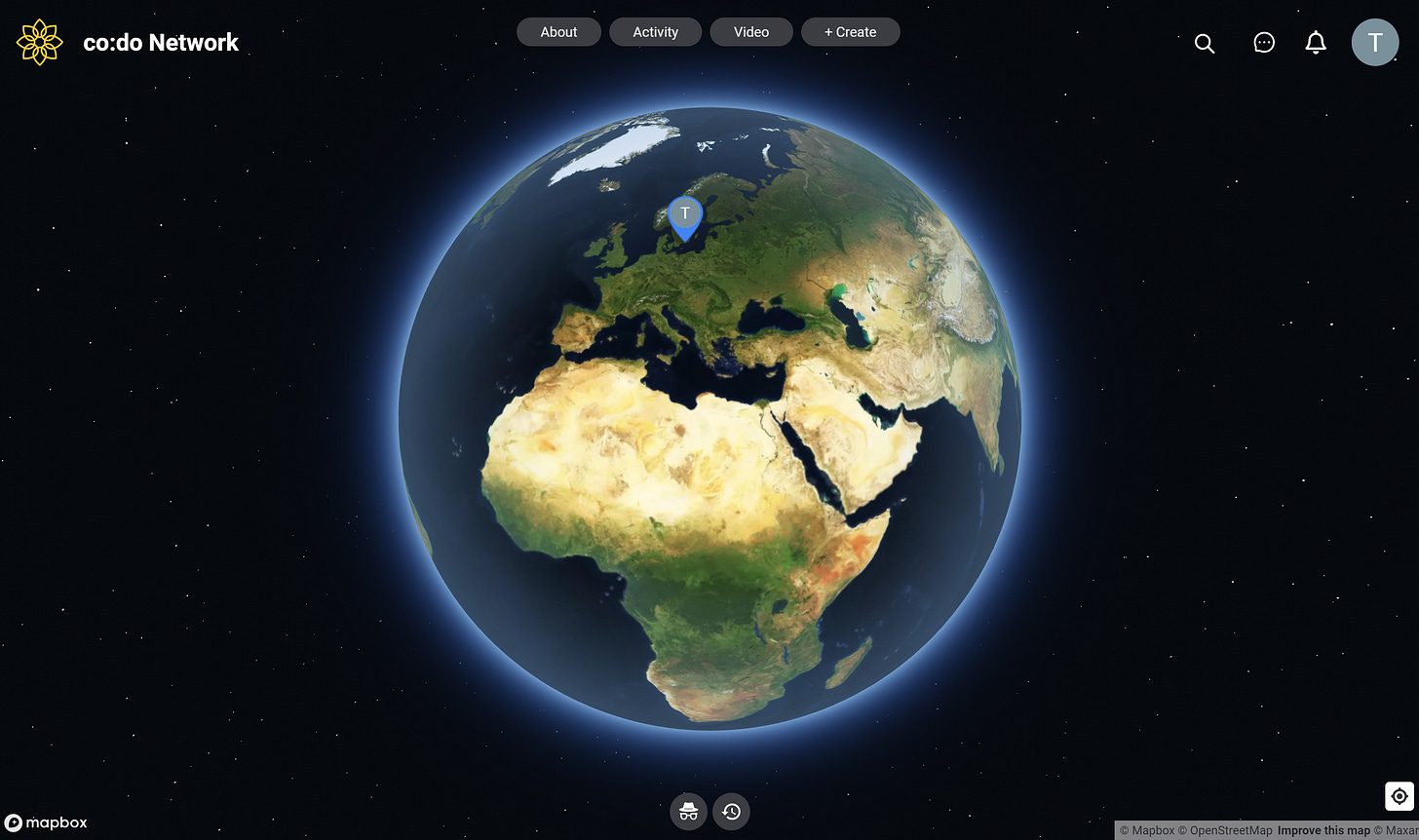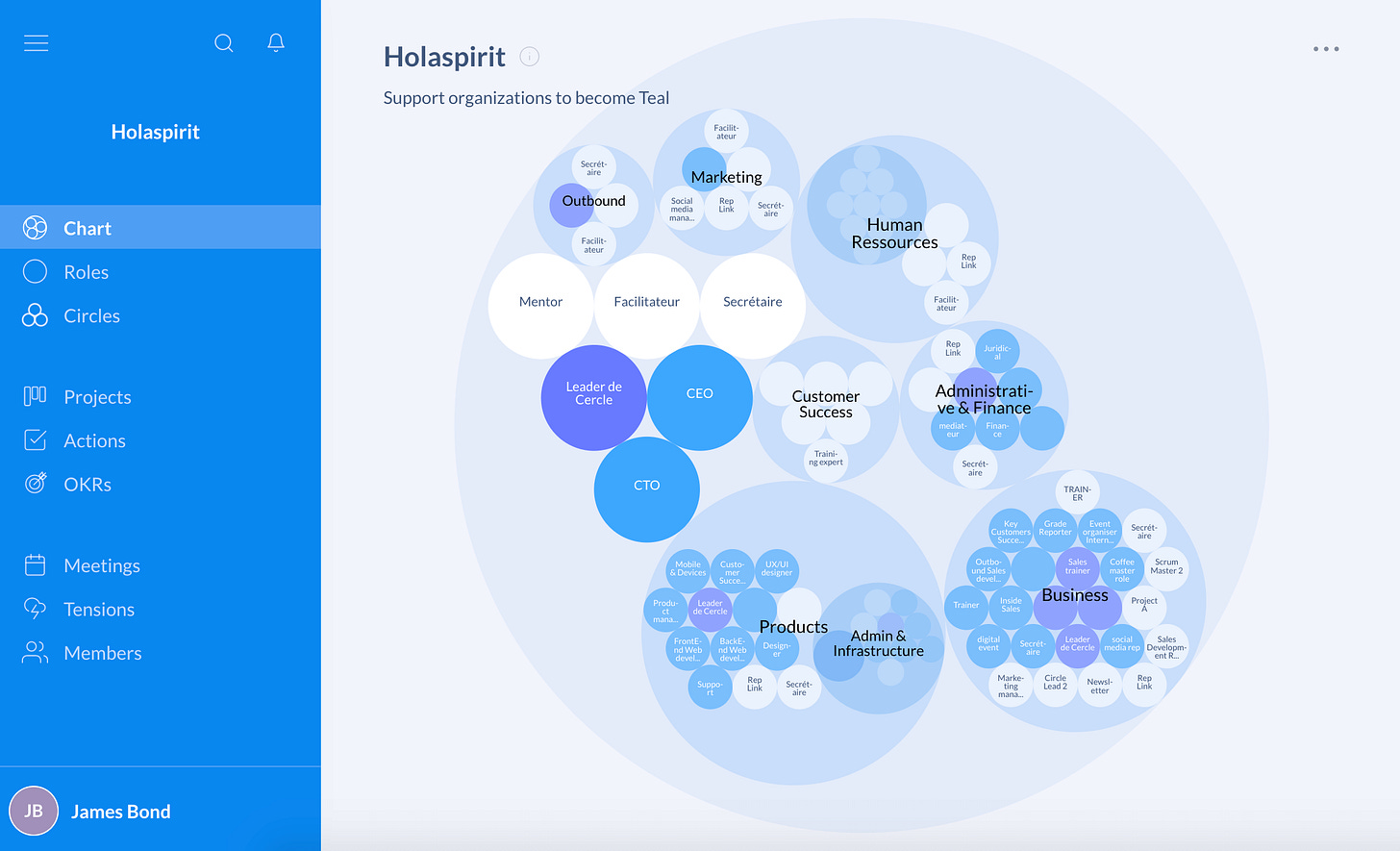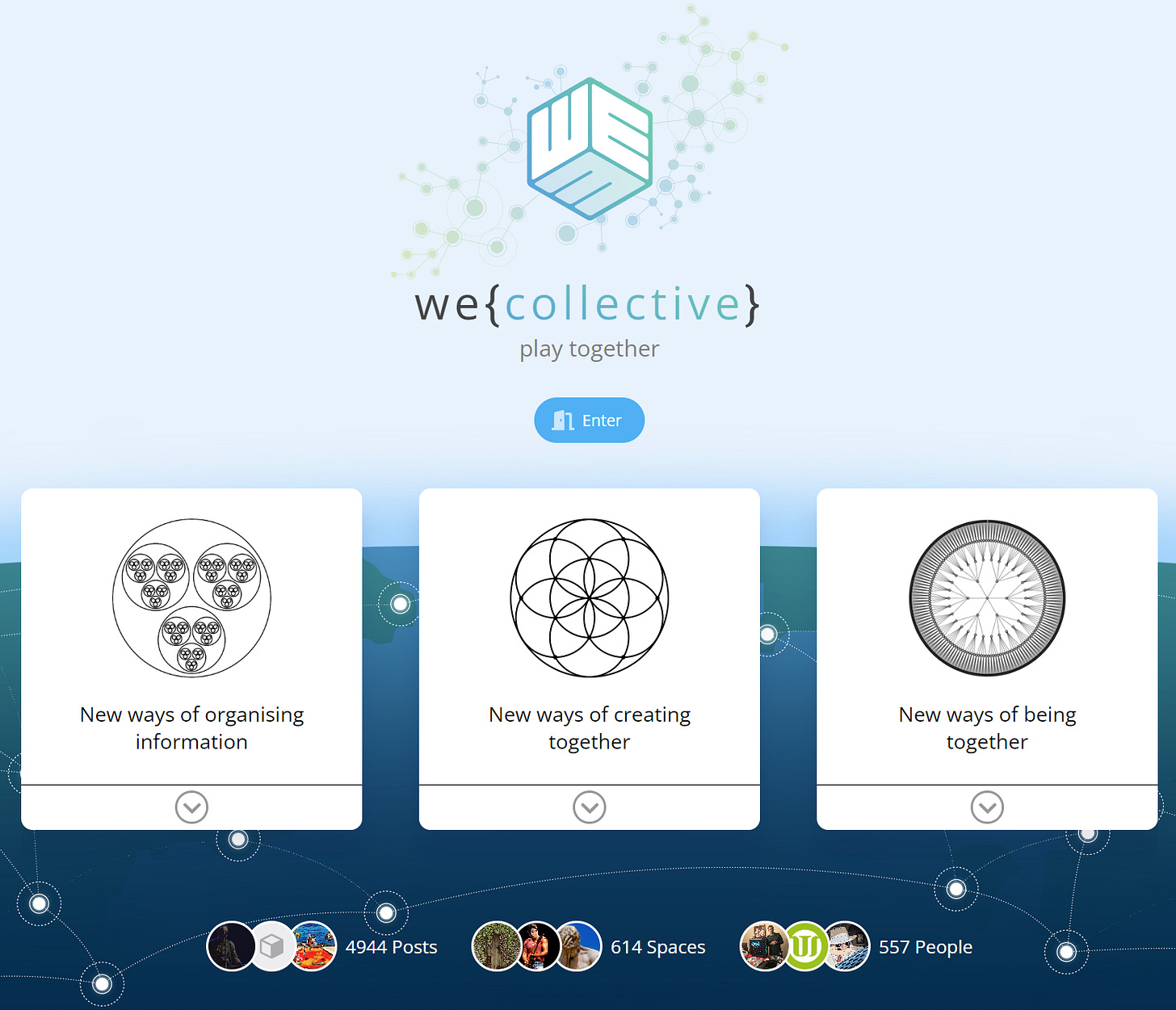“Selfishness beats altruism within groups. Altruistic groups beat selfish groups. Everything else is commentary.”
—Edward O. Wilson
No Regeneration without Radical Collaboration
The regenerative movement—the movement that puts life at the centre of every action and decision—is on the rise. While more and more puzzle pieces are (re)discovered, the movement remains fragmented and incoherent, like a scattered jigsaw puzzle.
Catalyzing regeneration on a planetary scale requires radical collaboration—collaboration that transcends boundaries, breaks silos and dissolves egos. We need to weave our actions together into a beautiful tapestry of local, (bio)regional, national and global initiatives.
Platforms play a key role in fostering collaboration. However, most commonly used collaboration platforms are not built for radical collaboration. Platforms like Slack, Discord, Hivebrite, Mighty Networks and Circle are designed to enable collaboration solely within particular groups—not across siloes and networks.
How might a mycelial platform look like, one that weaves together individuals, communities and projects, within, between and across networks, in order to catalyze planetary regeneration?
Below I share some of the most transformative attempts out there 👇
Hylo
Hylo is an open-source platform built to evolve a culture of stewardship that unleashes the emergent, distributed coordination needed to regenerate our world. With its unique holonic architecture, Hylo helps communities build trust and relationships, share knowledge, make sense and decide together, and coordinate prosocial and bioregional action.
With its geographical map, discussions, events, member directories, requests, offers, projects and resources, it was my platform of choice to co-create the Regeneration community two years ago.
4 Returns
The 4 Returns Community, an initiative of Commonland, is an online community that aims to restore 100 million hectares of degraded land by 2040. It promotes a holistic approach that emphasizes that investing in healthy landscapes delivers 4 returns: the return of inspiration, and the returns of natural, social, and financial capital.
Mycelium
Mycelium (what's in a name), created by my friend Cas Hendriks, is a decentralized network of organizations. Simply click the Mycelium button in the bottom left corner of each connected website, and the unique relationships, events and knowledge are showcased directly on each website. Radical collaboration, without the need for a central platform.
Superhive
SuperHive is a platform to support community connection. It’s the first interactive, community-generated newsletter that lets communities easily share and respond to member needs, asks and offers - directly from their inbox.
Catalist
Catalist, created by my friend Vincent Arena, is a connection platform that provides community knowledge management, mapping, and matchmaking services to networks building a more regenerative and equitable future. With its data interoperability, chat integrations, community-curated knowledge, event and conference management tools and actionable directories, Catalist allows for true cross-network collaboration.
Socialroots
Socialroots makes it easy for change-makers to engage their teams and networks, keeping everyone informed, aligned, and focused. It helps you understand and navigate your network, balance relationship building and action, spend less time on logistics and engage and align groups across networks.
Planet
Planet, by Climate Action Systems, is a platform designed to accelerate and amplify impact through collaborative climate action. Using Planet you can collaborate both within and outside your organization, meet driven people, build lasting action networks, create innovative solutions, and leverage powerful collaboration tools that accelerate change.
Open Impact
Open Impact, by Open Future Coalition , is both a rich network of global changemakers and a tool for all things “doing”— letting you spend more time on what you do best: serving your mission. Access the tools you need to work together more effectively, learn from other efforts, measure your progress as you go, and connect with an ecosystem of peers, volunteers, & funders.
Karrot
Karrot is a free and open-source tool for grassroots initiatives and groups of people that want to coordinate face-to-face activities on a local, autonomous and voluntary basis. It is designed in ways to enable community-building and support a more transparent, democratic and participatory governance of your group.
Tribes
Tribes, by Regen Tribe, helps you find and build regenerative neighbourhoods. Connect with the global network of people creating regenerative neighbourhoods, share resources, find organizations, co-create community blueprints and showcase events on the shared events calendar.
co:do Network
co:do Network is an open-source platform and network of changemakers connected in a peer-to-peer way sharing resources across the globe. With the global view, you can explore all the communities, users, events, and posts that make up the greater community.
Acter
Acter is an all-in-one organizing tool for grassroots and non-profits, focused on engagement and impact. With end-to-end encryption, limited metadata collection, a decentralized model, and a low data mode for those with slow internet connections, it ensures secure and private access to organize change.
Weavr
Weavr, built by Kumu, is a gathering place for impactful communities. Focus on the relationships that matter, and the work they enable. Attend to the health of the whole and strengthen relationships around shared interests and passions.
Murmurations
Murmurations is an open-source decentralised data-sharing project, which provides a flexible approach to ontology to accelerate the use of interoperable, composable data and maps.
Gebiedonline
Gebiedonline (Dutch) provides a cooperatively owned online platform through which residents can work together to improve the liveability of their street, neighbourhood, village or town.
Ootopia
Ootopia App (still under development) is designed to amplify the Regenerative Movement. It is a tool for inspiring, learning and sharing actions that can be taken by anyone in the here and now. It combines social networking, a learning platform, an ethical marketplace and a social currency in a gamified experience.
nestr
nestr (a GlassFrog alternative) is a collaboration platform for Purpose-Driven work using self-organization and AI. Visually organise in circles & roles with clear accountabilities, capture and track projects and tasks, communicate with contextual chats and get help from the AI assistant.
Holaspirit
Holaspirit (another GlassFrog alternative) is a self-management platform that enhances team performance and agility. With Holaspirit’s dynamic chart you have a clear view of your organizational roles, circles, projects, actions, OKRs, meetings and tensions.
we{collective}
we{collective} is an evolving, open-source, biomimetically inspired experiment in social network design, collective intelligence, and cooperative ownership. The platform has a unique interlinked holonic community framework modelled on the human brain and designed to help users connect, organise, build upon, remix, filter, and explore social content more efficiently.
The Digital Spaces Directory
created a comprehensive database with over 200 of the most interesting digital social spaces that are taking steps towards a flourishing, prosocial future online.Towards a Digital Pluriverse
While there are many promising developments in the social tech space, many of the myceliating tools and platforms mentioned above are still under development and not ready for widespread use. This is incredibly frustrating, as there are so many talented people working on increasing revenues, monopolies and tech addiction for companies like Google, Twitter and Meta.
With the community of technologists, designers and systems thinkers, we need to openly work together to co-create interoperable social tech. Tech that's in service to the agency, justice and wellbeing of all. Because only together we can transform the Metaverse from a 'Monoverse' into a digital 'Pluriverse'.

Join the Collaborative Tech Alliance (CTA)
Many of the platforms mentioned above are part of the Collaborative Tech Alliance (CTA). CTA facilitates collaboration among those building social technology in service to a thriving world. You can become a member of CTA by signing this pledge and committing yourself to follow the CTA principles.
Subscribe to The Mycelium
What are your experiences with tools and platforms for radical collaboration? And do you have any suggestions or feedback for this post? Let me know in the comments 👇
Subscribe to The Mycelium and become part of an emergent regenerative network, together with 23,000+ others.
























Tijn, you are making a significant contribution. Just saw this post today! Between 2014-2019, my technologist friend and I built a company, got some funding and built what we called One Sphera, to accomplish much of what some of the these applications are working towards. I have a whole chapter in my book about it and share some learnings. It is on the shelf at this point, so we never released it.
Couple things:
1. The tech seems to be coming down to earth, so to speak, in that it is starting to solve problems of collaboration and coordination at the grassroots.
The challenge is that technologists really don't have direct experience with the real needs of the primary players in a local community - nonprofits, mainstreet businesses, and local government. Instead, what we see today are more "regenerative" project oriented activities rather than an attempt to build a parallel society or economy with mainstream actors.
2. Since technologists generally don't have experience with overall grassroots community development (how nonprofits, businesses, and local governments operate) they are far away in terms of their "product/market" fit.
The tech we built actually emulated real-world community development so the features were all geared to serve those real-world needs.
3. You were describing inter-operability and it is a great direction. The challenge is that present the technologists are still forced by the exigencies of making a living, that they are still separate data silos. I realize that the Collaborative tech Alliance is moving in that direction.
I have spoken with multiple leaders of global networks, who also have a local focus, and their tech buildout is primarily for their internal coordination , so data silo-ing is still the primary on the ground reality.
4. Currently, there is not general agreement about what terms such as bioregional communities means. There has been no agreement on what scales the different players are operating on. So, there needs to be a coordination of all those involved to start making agreements about the scale -- ecovillage - neighborhood - local organization - network of community groups - city - region - bioregion - nation - global.
Since these terms haven't been defined it it hard to know what you are coordinating and why do one thing one way versus another.
5. Building the planetary superorganism. If we are to invert the pyramid of financial and political power globally, we need to start thinking about unifying frames and get agreement with all of the network leaders. We are far away from that because most leaders are "ahistorical"- they think their ideas are new ones and they generally don't incorporate what has worked historically.
That's one conversation I plan to have as my book release progresses.
One example of an historic idea is Mahatma Gandhi's notion of a Commonwealth of Village republics, as away to build up bottom up power down to the village level. Even Thomas Jefferson, early President of the US advocated this for the developing US.
Today is the 65th anniversary of the Sarvodaya movement in Sri Lanka. They have built a national network of 5,000 "micro" bioregional ecosystem networks. Hardly anyone is studying this. I remember last year I started a conversation with Refi, Web 3.0, and regen folks on Twitter and hardly anyone was interested.
Yet, it is a functioning model. I bring this up because I believe we need a coherent idea like that, that has been proven to work, that can add focus and coherence to the efforts by technologists.
I believe in a nutshell that's the main challenge: there is no conversation yet to have an agreement on a vision like building a Global Commonwealth of Regional Economies that we can all get behind. That's actually one of the conversations I will be bringing up, as I meet more network leaders and support them in building these on the ground whole community efforts.
Anyway, that turned out to be a long post. I hope that was okay! Keep up the amazing work you are doing Tijn.
Hi Tijn,
Thanks for this excellent list - it's great that you included Murmurations, which I work on.
However, I wanted to point out that Murmurations is actually a protocol, not a platform, so does not really compare directly to most of the other projects in your list as really it sits in a different category because the protocol "enables collaboration across silos and networks", which - as you point out - is the holy grail!
We are currently working with Hylo and Catalist (via the Collaborative Technology Alliance) to help them integrate their platforms via Murmurations, so that changes to a Group's Profile on one platform show up on the other platform too...
We've also built a Wordpress plugin to enable people to create decentralised, interoperable Profiles (which can be aggregated and shown on multiple maps and directories) and a Mapping plugin which enables people to quickly and easily create custom maps from the decentralised Profile data...
But that's not all Murmurations can do! The design of the protocol, with its open field and schema library ( https://github.com/MurmurationsNetwork/MurmurationsLibrary ) enables anyone to build new schemas (collections of fields) by reusing existing fields (and adding new fields if needed) to map any other kind of data. (E.g. we already have an 'Offers & Wants' schema too ...) So whenever fields are reused the data which is shared is obviously interoperable across platforms and networks.
I hope this makes sense and is of interest?
Keep up your great work spreading info about planetary collaboration!
All the best
Oli